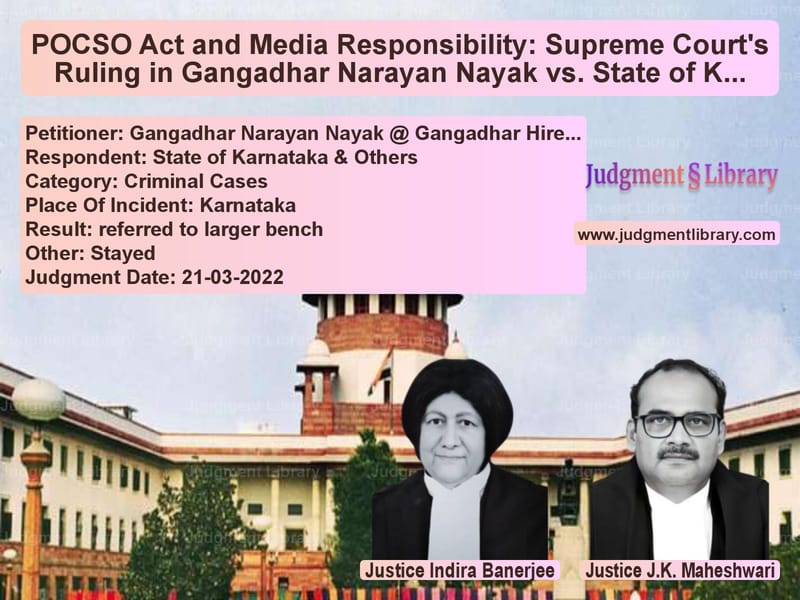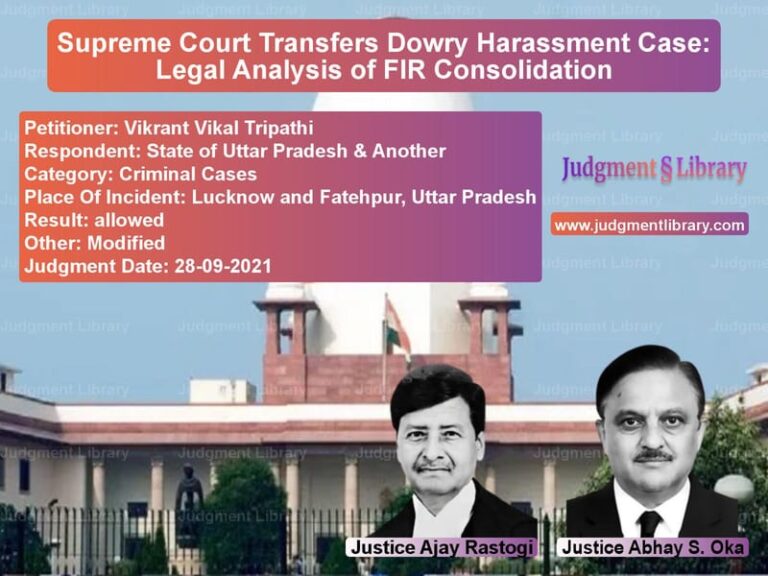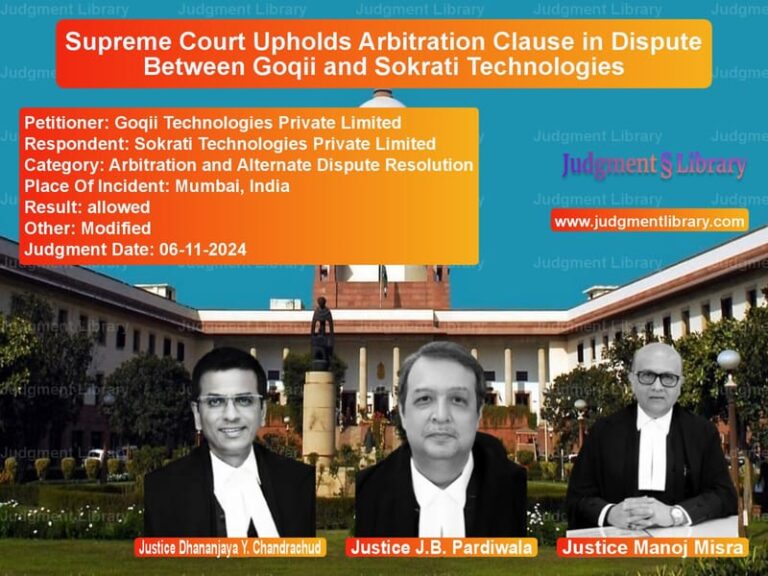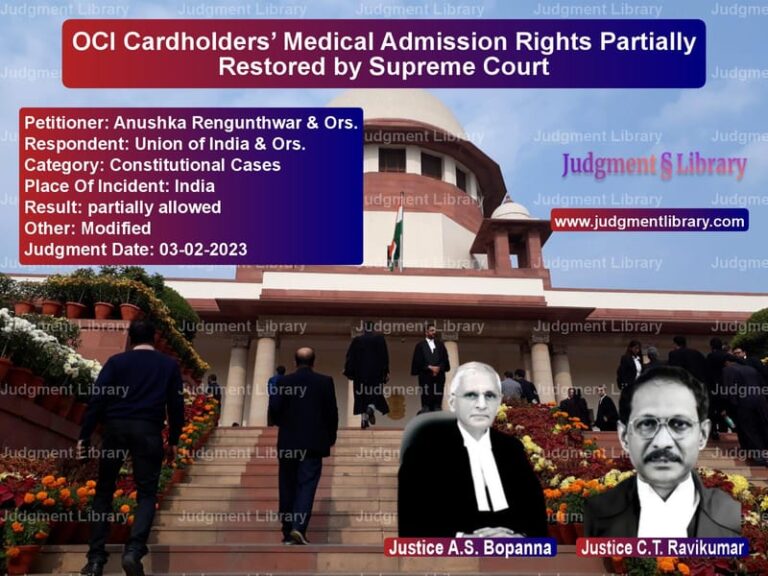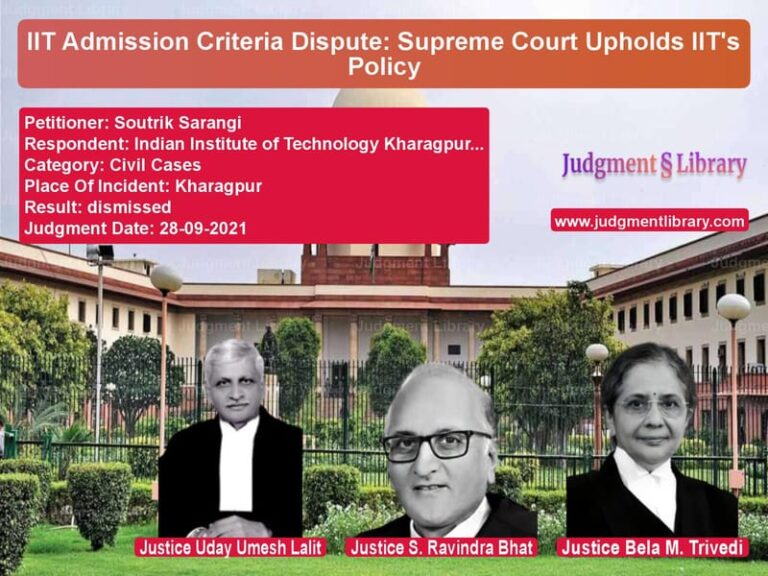POCSO Act and Media Responsibility: Supreme Court’s Ruling in Gangadhar Narayan Nayak vs. State of Karnataka
The case of Gangadhar Narayan Nayak @ Gangadhar Hiregutti vs. State of Karnataka raises an important legal question regarding the Protection of Children from Sexual Offences Act (POCSO) and the role of the media in reporting sexual offenses involving minors. The Supreme Court had to determine whether publishing the identity of a child victim in a news report violated Section 23 of POCSO and whether the police investigation into such an offense was legally valid without prior approval from a magistrate.
Background of the Case
On October 27, 2017, a news report was published in the Karavali Munjavu newspaper regarding the sexual harassment of a 16-year-old girl. The article disclosed the victim’s identity, including her name, violating her right to privacy. The victim’s mother filed a complaint on October 30, 2017, under Section 23 of POCSO.
Section 23 of POCSO strictly prohibits media from publishing any details that could reveal the identity of a child victim of a sexual offense. The penalty for violating this provision includes imprisonment of up to one year, a fine, or both.
Following the complaint, the police initiated an investigation, and a chargesheet was filed before the Principal District Judge, Uttar Kannada, Karwar, on December 31, 2017. The trial court took cognizance of the offense on April 19, 2018 and issued summons to the appellant.
Petitioner’s Arguments (Gangadhar Narayan Nayak)
The appellant challenged the legality of the investigation on the following grounds:
- Section 23 of POCSO is a non-cognizable offense, which means that police cannot investigate such a case without prior approval from a magistrate under Section 155(2) of the Code of Criminal Procedure (Cr.P.C.).
- The police filed the chargesheet without obtaining the required sanction from a magistrate, rendering the entire investigation illegal.
- Since POCSO does not explicitly state whether Section 23 is cognizable or non-cognizable, the Cr.P.C. provisions should apply.
- The High Court of Karnataka erred in holding that POCSO overrides the procedural safeguards of Cr.P.C.
Respondent’s Arguments (State of Karnataka)
The prosecution countered the appellant’s claims by asserting:
- POCSO is a special law that overrides the Cr.P.C. in cases involving child protection.
- Section 19 of POCSO mandates the immediate reporting and investigation of child abuse cases, which includes Section 23 violations.
- The purpose of POCSO is to provide protection to child victims and to ensure swift justice. Technical procedural lapses should not obstruct legal action against a clear violation of the law.
- Even if prior magistrate approval was required, the trial court’s cognizance of the case rectified any procedural errors.
Supreme Court’s Observations
The Supreme Court analyzed the legal provisions of POCSO in conjunction with Cr.P.C. and made the following observations:
- Section 23 of POCSO is a non-cognizable offense since it prescribes a maximum punishment of one year, which falls under the category of non-cognizable offenses as per the Cr.P.C.
- Section 19 of POCSO does not override Cr.P.C. for non-cognizable offenses. While Section 19 provides a reporting mechanism, it does not classify all offenses under POCSO as cognizable.
- Police investigation without magistrate’s approval was illegal. Since Section 23 is non-cognizable, the police should have obtained prior approval from a magistrate under Section 155(2) of Cr.P.C.
- The High Court misinterpreted the non-obstante clause in Section 19. While POCSO overrides certain provisions of Cr.P.C., it does not negate the procedural requirements for investigating non-cognizable offenses.
Final Judgment
The Supreme Court issued a split verdict:
- Justice Indira Banerjee ruled in favor of the prosecution, stating that POCSO overrides Cr.P.C., and the police were justified in proceeding with the investigation.
- Justice J.K. Maheshwari dissented, holding that the police investigation was unlawful due to the lack of prior magistrate approval.
- Since the Bench was divided, the case was referred to the Chief Justice of India for assignment to a larger Bench.
Key Takeaways from the Judgment
- POCSO Act Does Not Automatically Make All Offenses Cognizable: The Supreme Court clarified that the classification of offenses must be determined based on their prescribed punishment.
- Prior Magistrate Approval is Required for Non-Cognizable Offenses: Police officers cannot unilaterally investigate non-cognizable POCSO offenses without judicial authorization.
- Media Has a Legal Responsibility: Publishing a child victim’s identity is a serious offense under POCSO, reinforcing the need for ethical journalism.
- Judicial Clarity Needed on POCSO Procedure: The split verdict highlights the need for further legal clarification on procedural aspects of investigating non-cognizable offenses under POCSO.
Conclusion
This case presents a crucial conflict between child protection laws and procedural safeguards in criminal investigations. While the Supreme Court recognized the importance of POCSO’s objectives, it also emphasized that due process must be followed. The final verdict from a larger Bench will provide further clarity on the jurisdiction of police in investigating non-cognizable offenses under POCSO and the scope of procedural safeguards for accused individuals.
Petitioner Name: Gangadhar Narayan Nayak @ Gangadhar Hiregutti.Respondent Name: State of Karnataka & Others.Judgment By: Justice Indira Banerjee, Justice J.K. Maheshwari.Place Of Incident: Karnataka.Judgment Date: 21-03-2022.
Don’t miss out on the full details! Download the complete judgment in PDF format below and gain valuable insights instantly!
Download Judgment: gangadhar-narayan-na-vs-state-of-karnataka-&-supreme-court-of-india-judgment-dated-21-03-2022.pdf
Directly Download Judgment: Directly download this Judgment
See all petitions in Bail and Anticipatory Bail
See all petitions in Fraud and Forgery
See all petitions in Cyber Crimes
See all petitions in Juvenile Justice
See all petitions in Extortion and Blackmail
See all petitions in Judgment by Indira Banerjee
See all petitions in Judgment by J.K. Maheshwari
See all petitions in Referred to Larger Bench
See all petitions in Stayed
See all petitions in supreme court of India judgments March 2022
See all petitions in 2022 judgments
See all posts in Criminal Cases Category
See all allowed petitions in Criminal Cases Category
See all Dismissed petitions in Criminal Cases Category
See all partially allowed petitions in Criminal Cases Category

